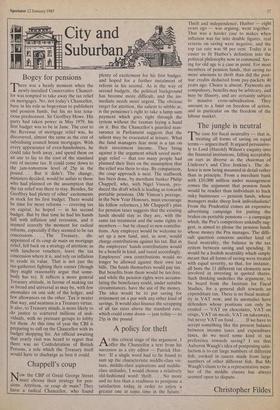The jungle is neutral
The case for fiscal neutrality — that is, treating all forms of saving on equal terms — argues itself. It argued persuasive- ly to Lord (Harold) Wilson's enquiry into the financial institutions, falling acceptably on ears as diverse as the chairman of Unilever's and Clive Jenkins's. The de- fence is now being mounted in detail rather than in principle. From a merchant bank with £10,000 million under management comes the argument that pension funds would be readier than individuals to back risky businesses — pension funds, whose managers make sheep look individualistic! From the Prudential comes an expensive advertising campaign for putting the brakes on portable pensions — a campaign which, the Pru's competitors unkindly sug- gest, is aimed to please the pension funds whose money the Pru manages. The diffi- cult question concerns another kind of fiscal neutrality, the, balance in the tax system between saving and spending. It would be a foolish neutrality which simply meant that all forms of saving were treated with equal severity, so that, for instance, all bore the 11 different tax elements now involved in investing in quoted shares. Such thinking underlies the argument, to be heard from the Institute for Fiscal Studies, for a general shift towards an
expenditure tax. There is no fiscal neutral- ity in VAT now, and its anomalies have defenders whose positions can only be eroded — VAT on chocolates, VAT on crisps, VAT on meals, VAT on takeaways, but never VAT on food . . . . If we have to
accept something like the present balance
between income taxes and expenditure taxes, do we need some kind of tax
preference towards saving? I see that Auberon Waugh's idea of postponing satis- faction is to eat large numbers of different fish, cooked in sauces made from large numbers of other different fish. But Mr Waugh's claim to be a representative mem- ber of the middle classes has always seemed open to dispute.
Christopher Fildes






































 Previous page
Previous page